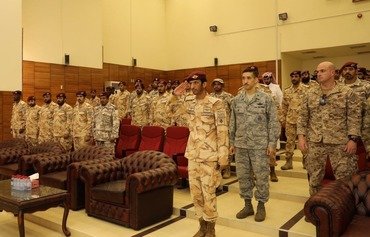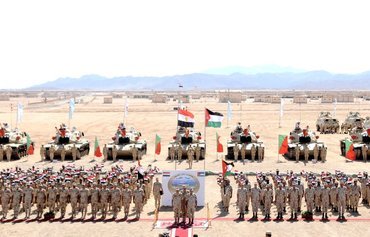Egyptian and Jordanian armed forces recently concluded joint military exercises in Jordan's armed forces military training fields in a bid to boost capability and long term co-ordination, and to train on responding to potential security threats.
The 20-day "Aqaba 2016" drills, held from November 5th to 25th, involved units of the army, navy, air force and Special Forces from both countries.
The joint exercises send "an important message directed at terrorist groups in the region and reveal the level of readiness to confront them, not only in Egypt or Jordan, but in any part of the region", said military analyst Maj. Gen. Abdul Karim Ahmed, a retired Egyptian army officer.
These exercises come at a critical time for the region, he said.
"It is clear the joint exercises raise the level of readiness needed to confront terrorist threats, seeing as most terrorist groups, regardless of their names and locations, use the same combat approach," he added.
Jordan is under threat from terror attacks, having been targeted by more than a few , he said, and faces potential cross-border threats from adjacent Syria.
Meanwhile, "Egypt is currently involved in a real war against terrorists in Sinai , where it is fighting daily battles against armed groups", he said.
The Aqaba 2016 drill included theoretical and practical courses developed based on the terror threats the region faces, Ahmed said, and were conducted on various types of terrain.
These included training for naval Saiqa Commando Forces and Marine Commandos, training on maritime interdiction operations, counter-piracy operations, vessel board and search operations and marine landings, he said.
They also included training on Air Force special operations, encompassing surveillance, reconnaissance and electronic jamming operations; while ground forces focused on counter-terrorism operations and storm, assault and hostage-release operations.
Marksmanship exercises were conducted with all types of weapons, he added, while the Rapid Intervention conducted line of fire tactical training and participated in several types of firing with live ammunition exercises.
Joint exercises create affinity
"It is very important that joint exercises be conducted by countries located in the same geographic region," said terror group specialist and retired Egyptian military officer Maj. Gen. Wael Abdul Muttalib.
This is to enhance the combat capabilities of the soldiers, draw closer the methodologies of the two armies, and create an affinity between them through joint training, he told Al-Mashareq.
It also is important to learn how to operate "under joint operations rooms that may be established to deal with any circumstance or potential terrorist threat, in anticipation of, and preparation for, any joint co-operation that might take place in the future", he said.
Egypt and Jordan have taken part in several joint military exercises in recent years, Abdul Muttalib said.
"Egyptian forces have held similar manoeuvers with a number of countries in the region, including the UAE, Saudi Arabia and Bahrain," he noted.
Other recent joint military training exercises held by the Egyptian armed forces include the "Morjan 15" naval exercises with Saudi Arabia, the "Horus 2015" joint air force exercises with Greece, joint commando exercises with Italy, joint special forces exercises with British SAS forces, "Ramses 2016" naval exercises with France and the "Eagle Salute 2016" exercises with US and UAE forces.
The largest of these were the recent "Northern Thunder" exercises in Saudi Arabia with the participation of 22 Arab and Muslim countries, he said.
Exchange of military experience
The recent exercises in Jordan are important to Egypt, as they are conducted on foreign territory, said strategic analyst Maj. Gen. Yahya Mohammed Ali, a retired Egyptian officer.
"The transport logistics alone have specific military standards, arrangements and protocols, as logistics, transport and maintenance teams are heavily involved in the process because they shoulder the responsibility of transporting personnel and equipment to distant lands," he said.
The army gains a great deal of experience in moving quickly and readying for battle away from their familiar posts and deployment locations, he added.
The benefits the Egyptian army derives from participating in joint exercises include the exchange of military expertise and learning to handle different types of weaponry, Ali said.
"Military armaments differ from one country to another depending on [each country’s] armament supply agreements, in addition to the benefit of training at more than one location for military operations and potential wars," he said.
Drills such as "Aqaba 2016" help both sides identify problems they may face during training, which will enable them to quickly address them should they arise in actual combat situations, he said.

![Egyptian and Jordanian armed forces recently concluded 20 days of joint exercises in Jordan’s armed forces military training fields. [Photo courtesy of Egyptian Armed Forces]](/cnmi_am/images/2016/12/12/6751-Jordan-military-exercises-600_384.jpg)





